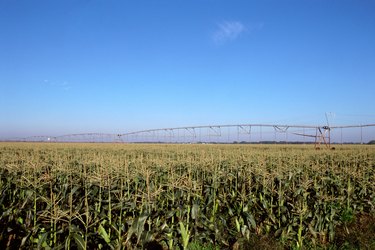
Consider vegetables with a built-in herbicide, or grains containing mega-vitamins, or maybe harvesting decaffeinated coffee directly from the tree. All of these biotechnologically enhanced plant foods have been created to improve, change or dramatically enhance the natural genetic makeup of these plants. While farmers have been altering the makeup of plants for hundreds of years through cross-breeding and selective planting, scientists have been quietly engineering human food sources since the early 1940s, and actively and openly using GM plants since the mid-1990s.
Understanding DNA
Video of the Day
Chromosomes, genes and DNA are the foundation of genetic engineering and the science of biotechnology. In the human cell, genes contain the blueprint for such human traits as eye color and height. Similar to humans, plants and other organisms also contain DNA that distinguishes specific traits. By taking DNA from one organism and transferring it into another, scientists are, in effect, able to keep the best traits of both organisms. The controversy lies in the fact that DNA from dissimilar organisms is being transferred freely without the knowledge of long-term consequences.
Video of the Day
Advantages
Using biotechnology in the growth and production of fruits and vegetables has enabled scientists to change the way they ripen. Normally fruits and vegetables continue to ripen after harvesting; they must be rushed to market and sold quickly while they are fresh. Genetically modified produce can be harvested when ripe, and the ripening process stops, giving them a longer shelf life. These genetic modifications also increase a plant's resistance to disease, pests, insecticides, herbicides and even extreme weather conditions. Genetic engineering has also altered a plant's nutritional makeup, making it richer in certain vitamins or minerals.
Disadvantages
Despite harvesting thousands of genetically modified plants, scientists still do not have a clear understanding of how these genetic changes affect the human body long term, primarily because these food plants have only been available since the early 1990s. Monsanto, the largest GM seed developer in the world and the organization that provides a majority of the research results to the FDA, says GM seed is harmless to humans. However, some scientists have found that GM plants have indeed altered the life span, disease process and cognitive abilities of insects that feed on these plants. Research is ongoing.
Regulations
Bioengineered plant foods fall under the jurisdiction of three agencies: the U.S. Food and Drug Administration, the U.S. Department of Agriculture and the Environmental Protection Agency. While the FDA determines the safety of genetically modified plants, companies that plant and harvest these crops are asked to voluntarily submit test results -- it is not a requirement. The USDA determines whether the new plant variety will adversely affect the environment or agriculture in general. The EPA regulates pesticides and determines tolerance levels in animals and humans.